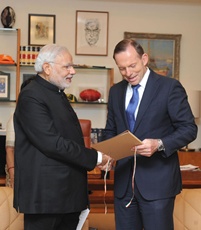Modi, Abbott agree to boost strategic ties as Australia, China sign free trade pact
18 Nov 2014
A day after Canberra signed a free trade pact with Asian super power China, Indian Prime Minister Narendra Modi and his Australian counterpart Tony Abbot on Monday reaffirmed their decision to improve strategic partnership between the two countries, which they said, was based on converging political, economic and strategic interests and a shared desire to promote regional and global peace, security and prosperity.
 India and Australia decided to establish a framework for security cooperation to reflect the deepening and expanding security and defence engagement between India and Australia, and to intensify cooperation and consultation between Australia and India in areas of mutual interest.
India and Australia decided to establish a framework for security cooperation to reflect the deepening and expanding security and defence engagement between India and Australia, and to intensify cooperation and consultation between Australia and India in areas of mutual interest.
The framework will be implemented in accordance with an action plan that envisages annual summit and foreign policy exchanges and coordination, coordination of defence policy, cooperation in counter-terrorism and in combating other transnational crimes, border protection, coast guard and customs coordination, maritime security, disarmament and non-proliferation, includimng civil nuclear energy, disaster management and peacekeeping and cooperation in regional and multilateral fora.
Progress under the Action Plan will be reviewed through established institutional arrangements, including the foreign ministers' framework dialogue and the defence ministers' meeting.
Narendra Modi, who was given a rock star welcome by thousands of rapturous supporters in Sydney on Monday, described the closer ties as "natural".
"This is a natural partnership emerging from our shared values and interests and strategic maritime locations," he said in Canberra after inking agreements on security cooperation, narcotics control, social security, and tourism.
"Security and defence are important and growing areas of the new India-Australia partnership for advancing regional peace and stability and combating terrorism and transnational crimes," he said ahead of addressing the Australian parliament.
Modi's state visit to Australia, which comes alongside the G20 summit in Brisbane, is the first by an Indian prime minister in 28 years.
The visit also comes just two months after Abbott's tour of India, during which the two countries sealed a long-awaited nuclear energy deal.
Modi called for injecting new momentum into bilateral trade and business relations and sought easier access for Indian businesses to Australian markets and quicker investment approvals.
"India and Australia have a great economic synergy. There are huge opportunities for a partnership in every area we can think of - agriculture, resources, energy, finance, infrastructure, education and science and technology," he said.
"The economic climate in India has changed. I believe it will be a lot easier to convert opportunities into concrete outcomes."
On Monday, Australia sealed a landmark trade deal with China that will abolish tariffs in the lucrative resources and agricultural sectors as Canberra confronts a painful downturn in mining.
Abbott already has his eye on a similar outcome with India, flagging the prospect of a pact by the end of next year.
"By the end of next year we will have a free trade deal with what is potentially the world's largest market," he said, adding that both leaders "will make it happen".
"We can never forget that India is an intellectual powerhouse, a potential economic powerhouse," he said, pointing to trade being "underdeveloped" while urging better intelligence and military cooperation.
"There's an enthusiasm on both our parts for more bilateral and trilateral military exercises and we hope to see much more of that in the years ahead," Abbot said.




















